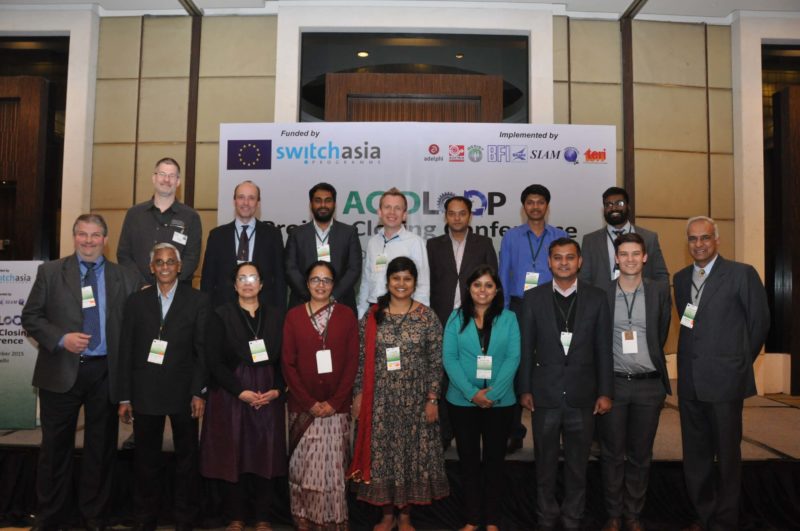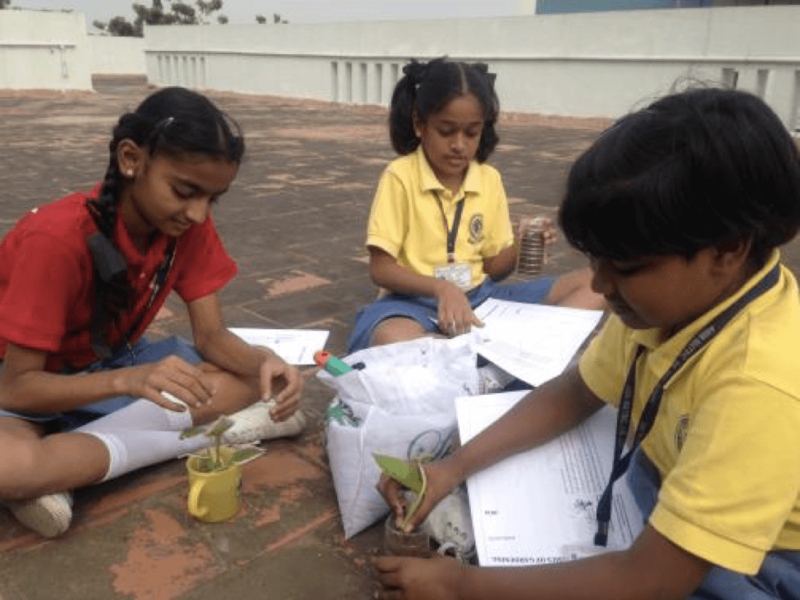Gujarat is one of India’s fastest growing states with petrochemical, chemical and pharmaceutical small and medium enterprises (SMEs) at the forefront of major industries. Growth has resulted in job creation and prosperity, but also risks to human health and safety, through pollution brought about mishandling of hazardous chemicals. For a sustainable future, the state and its SMEs require safe, secure and environmentally sustainable development by implementing a responsible production approach in Gujarat.
SECURE Gujarat is a public-private partnership programme, established by DEG, UL-DQS India and ASSIST that aimed to initiate a switch to a Responsible Production framework and build capacity for target SMEs. Using UNEP’s Responsible Production approach, the project provided SMEs with the necessary tools to engage businesses, supply-chains, distributors, traders and buyers in accident prevention and emergency preparedness. The focus was to increase overall chemical safety and consequently reduce environmental impact in the operations of SMEs.
A clear demand for Responsible Production was identified in the chemical industries operating in Gujarat, and through the project, immense value was generated for companies. 395 key representatives from the chemical industries across two states participated in the CEO forums, and 64 professionals trained to become experts in Responsible Production implementation. Moreover, 8 organizations were provided with technical assistance to successfully implement Responsible Production, with 500 self-assessment toolkits distributed to local trainers, professionals, and organizations.
Small milk farmers play a crucial role in India, one of the world’s top milk markets. Unlike developed nations, in India, currently, 75-80% of milk production still comes from them. However, these farmers face issues that limit their productivity and make it difficult to increase their earnings. With an annual production of 164 million tonnes of milk, the dairy sector in India generates approximately USD 70 billion of revenue a year and is supposed to grow heavily. The past few decades have seen an increase in private sector investment in dairy farming, supply chain, processing facilities and backward integration. Dairy farming is also an important secondary source of income for 70 million rural households in India. These small dairy farmers are also suppliers to many private dairy companies. Most of these farmers lack capacity. They have an average herd size of 2-3 animals that produce only 2-6 litres of milk per cattle per day, just under a third of that in the west.
ASSIST is undertaking the following project with Lactalis – to establish two integrated model dairy farms; capacitate fifty local dairy farmers as cattle custodians to build local capacity and extend technical support; provide advisory support to ten pilot dairy farms of committed, progressive small dairy farmers and transform them into high-productive and profitable dairy farms; promote balanced cattle feed management and clean milk production among 150 dairy farmers; and establish a dairy support center which will have a registry of helpline numbers for farmers to access. It will also have a feed bank that will cater to the year-round supply of cattle feed.
India has the largest number of people with uncorrected vision, with over 500 million people needing vision correction, including 42% of the country’s workforce. A factor contributing to this trend is the lack of availability of qualified human resources especially, in rural areas.
Co-financed by DEG and Essilor Private Limited and implemented by ASSIST, Eye Mitra aimed to provide quality vision correction services at affordable prices for underprivileged rural people in India. The project also facilitated successful candidates to set up small businesses on their own to offer vision care services to rural communities at an affordable price. These micro-entrepreneurs were recognized as Eye Mitra Opticians (EMOs). The project also enabled rural households to access vision care and good quality spectacles (for those who need them) at affordable prices. Thus, the rural youth hitherto unemployed will get her / his livelihood through a more respectable self-employment. With the growth in business, she/he would further employ other rural youth at their own store as supporting hands thereby, creating a replication for self-employment generation in rural areas.
With Eye Mitra, five training centers were set up; 350 youth were skilled and 220 Eye Mitras were qualified; 150 Eye Mitra shops were opened sustaining more than 100 new jobs earning USD 600 per month per EMO; and more than 8000 people’s vision was corrected effectively.
CHANCE was a GIZ-funded initiative with the goal to promote capacity building, regional dialogue and networking, especially for business intermediaries. The project aimed to strengthen and empower female entrepreneurs to fulfill their role in Southern Africa (SADC) and South Asia (SAARC) regions. Select Indian women entrepreneur associations (WEAs) were developed as Centers of Excellence in Entrepreneurship Education based on international benchmarks, leading to the creation of a national pool of trainers in India. A monitoring and evaluation program was also developed for impact assessment, while a report with consolidated inputs of the experts and stakeholders from the conference was distributed.
As a part of this project, a pre-winter school programme was organised for providing inputs on strategic management of women entrepreneurship associations and to enable networking amongst women entrepreneurs in the SAARC region. Additionally, over 55 factories were targeted through this engagement as beneficiaries to implement sustainable practices.
Acute shortage of electricity is a major problem that India faces currently. About 71% of electricity is generated from non-renewable resources which results in death from indoor pollution and carbon monoxide burning. However, India simultaneously possesses a huge potential for solar power generation. However, developments in the field of solar energy are met with the challenge of finding people with expertise in the field.
Co-financed by DEG and Phocos, and implemented by ASSIST, ENACT aimed to set up a solar academy to develop skilled technicians from among women and youth of rural areas through a well-structured training program. The larger aim of the project was to take a step towards addressing the problem of acute shortage of electricity in India through renewable energy alternatives.
Over the course of two years, ENACT has created mass awareness among the public on the use of solar energy and its efficiency when compared to other energy sources through various mobilization and awareness campaigns. This project informed more than 800 students in the fields of IT, science and engineering on solar energy and technology. Moreover, ENACT trained 141 students, of which 45 were women, as solar technicians and more than 50 trainers. Dealership was given to several solar technicians who started their own enterprises.
The Bureau of Energy Efficiency (BEE) in India has categorized the retail sector as an energy-intensive industry which needs to optimise its operations to become sustainable. The food and beverage sub-sector constitutes about 60% of the retail sector and generates large amounts of waste. In addition, 40% of food production is estimated to end up as waste due to improper handling, transportation, and storage.
The project Green Retail, therefore, targets the food and beverage small and medium enterprises (SMEs) in India in order to green the retail industry in the country by facilitating the switch to resource efficient practices in retailers’ operations and contributing to the evolution of green consumers. Green Retail was part of the European Commission’s SWITCH Asia Programme; and was implemented by ASSIST, the Confederation of Indian Industry (CII), Collaborating Centre on Sustainable Consumption and Production (CSCP), Retailers Association of India, AREC and STENUM Asia. This project involved agricultural and livestock producers, food processing industries, retailers and consumers across the value and supply chains.
ASSIST undertook the following interventions for this project: creation of a sustainable business model for retailers; management and oversight of supply chain members; promotions of sustainable consumption; strengthening of partnerships and sustainability reporting. Improvements were made in three focus-areas – supplier and manufacturing practices; retailing and in-store practices and consumption and end-of-life practices. Some of the positive impacts reported by the participating SMEs include a reduction in energy bills, reduction in consumption of oil, improved electrical safety, improved efficiency of thermal systems, increase in production and a decrease in carbon dioxide emissions.

Small and medium enterprises (SMEs) constitute a major part of the ancillary industry as well as the overall manufacturing sector in India, especially those dealing with metal finishing operations. These SMEs are often constrained into using inefficient processes and technologies leading to lower competitiveness, poor environmental performance and unsafe working conditions. Moreover, they are under constant cost and time pressure from their clients up the value chain.
Sustainable production through market penetration of closed loop technologies in the metal finishing industry (ACIDLOOP) is a 4-year action under the European Commission’s SWITCH-Asia Programme, which aimed to introduce technology innovation as well as resource efficiency in the metal finishing companies (SMEs) that would lead to improved environmental quality and combat pollution through advanced water treatment measures and energy efficient processes. The objectives of the project were (a) improved urban environmental quality in the urban regions of National Capital Region (NCR) and Chandigarh, Pune, Ahmedabad and Chennai; (b) improved living conditions in the target regions and (c) improved production technologies.
Some of the important activities carried out to achieve the project objectives include raising awareness and delivery of trainings on the concept of closed loop technologies, adaptation of resource efficiency toolkits and individual consultations on resource efficiency and acid recovery measures. ACIDLOOP was able to benefit a total of 106 companies through the individual consultation on resource efficiency and acid recovery measures. This resulted in an average decrease of more than 20% of material, energy and water consumption in participating companies across all regions. In addition to this practical demonstration, two acid recycling and one water recycling technologies were also showcased across all target regions.
i2Can – Inspiring and Igniting Young Minds is a series of experiential learning programs designed to provide in-school children with a combination of simple life skills and awaken in them the passion for green, clean and safe living. More specifically, the focus is on instilling the right values and skills on health, sanitation and hygiene, first-aid and emergency response, green living philosophy (reduce, reuse, recycle), ethics and morals and problem-solving and decision-making, which would enable the youth to become agents of change.
Through the above initiatives, i2Can aims to empower these young people to learn, practice, and thrive in their communities. They are also actively encouraged to share their knowledge with their immediate family and friends. The key beneficiaries of this programme are the urban poor and rural communities.
ASSIST undertook various activities during the implementation of this project that included teaching using live demonstrations, activity-based learning, workshops, seminars and lectures. By the end of 2017, i2Can had reached over 20,000 students and involved more than 450 schools in the southern state of Tamil Nadu, India.

School gardens serve as living laboratories where academic subjects can be integrated and the children can be active participants in the learning process.
In order to introduce children to such learning, 1,2,3 Grow was an initiative that promoted the creation of gardens at schools in the Indian state of Tamil Nadu. The main aim behind 1,2,3 Grow was for children to gain appreciation and respect for the environment that lasts into adulthood. The initiative also aimed to promote improved social skills amongst school children such as, working in groups and problem-solving; and to prepare them for higher education.
Gardens were built in private schools where children could practice their social skills and learn how to grow plants from which they get healthy food to eat. Workshops were also conducted as a supplementary activity to these pilot gardens.



